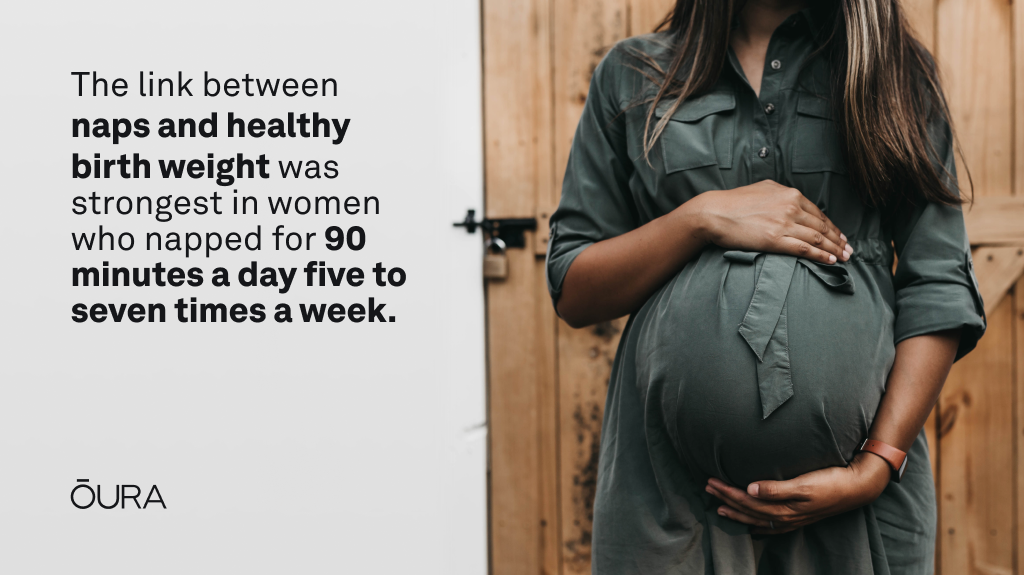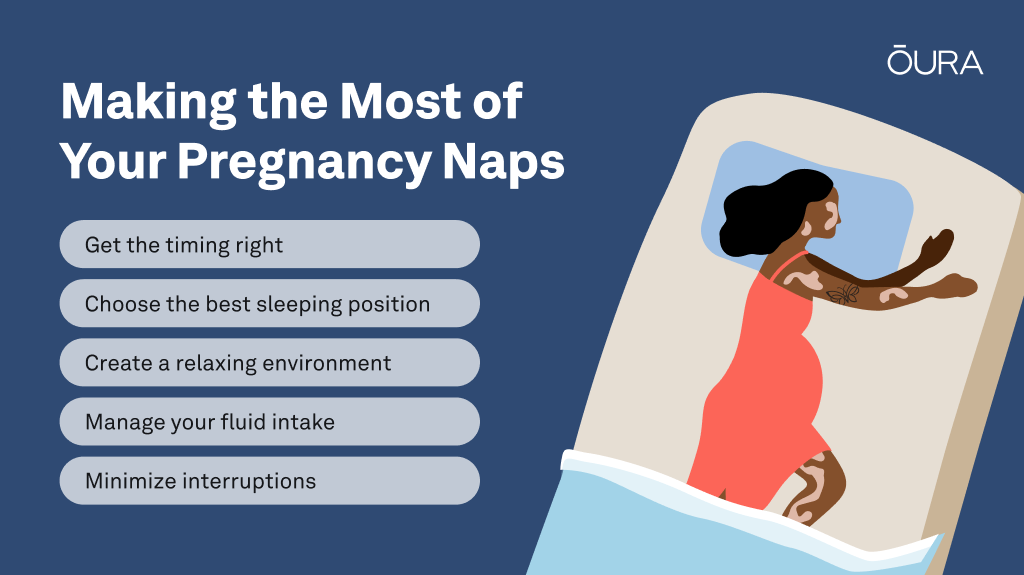Fatigue is often one of the first signs of pregnancy—and for many, it lingers well beyond the first trimester. Your body is working around the clock to grow a new human, and that takes energy.
Even if you weren’t a napper before, chances are you’ve felt the urge to sneak in a snooze. Good news: Napping during pregnancy has been shown to be beneficial for both you and your baby. So rest up.
| Member Tip: Pregnancy Insights offers trimester-by-trimester educational content and the ability to track how far along you are, all within the Oura App. Turn on Pregnancy Insights in the new Women’s Health settings, which you’ll find in the menu at the top left of your home screen. You’ll also be able to opt in after tagging a “Positive Pregnancy Test.” |
Why Napping During Pregnancy Matters
Pregnancy brings constant hormonal shifts and physical changes—many of which directly impact your sleep quality at night. That’s where naps come in.
Of course, finding time to nap isn’t always easy, especially if you work or have other children to take care of. While it’s not always possible to nap, if you’re able to sneak off for a siesta, you’ll enjoy several important benefits.
| Member Tip: With Oura’s Nap Detection feature, any daytime nap is automatically logged and reflected in your Sleep and Readiness Scores. |
Naps Can Boost Your Energy
Fatigue often peaks in the first and third trimesters, due to everything from hormonal fluctuations to restless sleep and frequent bathroom trips. A short nap can help you rebound and restore energy for the rest of the day.
Naps May Promote a Healthier Birth Weight
In the Healthy Baby Cohort Study, researchers found that women who napped regularly during pregnancy—especially 90 minutes per day, 5 to 7 days per week—were significantly more likely to give birth to babies with a healthy weight. Even shorter naps showed a protective benefit.

Naps May Help Regulate Mood and Lower Stress
Lack of sleep can make you feel irritable and anxious—especially when you’re juggling work, appointments, and preparing for a baby. Short naps have been shown to reduce cortisol (a stress hormone), boost mood, and help you feel more emotionally balanced.
| Member Tip: For more help managing stress during pregnancy, consider trying the mindfulness platform Open. Exclusive Offer for Oura Members: Start your subscription with Open and get your first 30 days free with code OURA. Offer available until May 20, 2026. |
Naps Can Help With ‘Baby Brain’
“Baby brain” or “mom brain” is real, and scientists may finally know why. It’s not just a lack of sleep that causes brain fog during pregnancy—new research suggests that pregnancy-related hormonal changes reduce gray matter in your brain, which influences the way different parts of your brain communicate with one another.
While naps won’t reverse gray matter changes, they can help sharpen your thinking—especially if poor nighttime sleep is part of the problem.
READ MORE: The Neuroprotective Benefits of Sleep
Naps May Ease Pregnancy Insomnia
Pregnancy insomnia affects up to 80% of women in the third trimester. While some worry naps will make it harder to sleep at night, studies suggest otherwise: in early pregnancy, daytime naps don’t disrupt nighttime rest—and may improve overall sleep quality.
READ MORE: How to Sleep Better During Pregnancy
Make the Most of Your Pregnancy Naps
Finding time to rest isn’t always easy—but these tips can help you optimize your nap time.

Time it Right
If possible, aim for naps between 60–90 minutes, especially in the afternoon. That said, any nap is better than none. A 20-minute power nap can improve alertness without leaving you groggy.
READ MORE: How Long Should You Nap? Is There a Perfect Nap Length?
Choose the Proper Sleeping Position
During pregnancy, your sleeping position matters. In later pregnancy, avoid sleeping on your back. Side sleeping—especially on your left side—can improve blood flow and oxygen delivery to your baby. Use a pregnancy pillow for extra support.
RELATED: Curling Up in Bed: The Impact of the Fetal Position on Overall Sleep Quality
Set the Scene
A relaxing environment can help you sleep better during a pregnancy nap. Turn off your electronic devices, close the curtains, use earplugs or soothing sounds like green noise to minimize interruptions, and make sure the room is at a comfortable temperature.
RELATED: 5 Ways to Upgrade Your Sleep Hygiene
Watch Fluids Beforehand
Stay hydrated throughout the day, but consider pausing liquids about 30 minutes before napping to avoid interruptions from frequent urination.
RELATED: The 10 Most Effective Coffee Alternatives for Pregnancy
Ask for Support
If you’re working or parenting other kids, you may need to ask for help. Don’t hesitate to lean on your village—whether that’s your partner, family, or friends.
The Bottom Line
Naps aren’t a luxury during pregnancy—they’re part of what your body needs. Whether you’re getting 20 minutes or 90, prioritizing rest can improve your energy, reduce stress, and support your baby’s development.
READ MORE: How Your Health Metrics Change During Pregnancy, According to Oura Data











